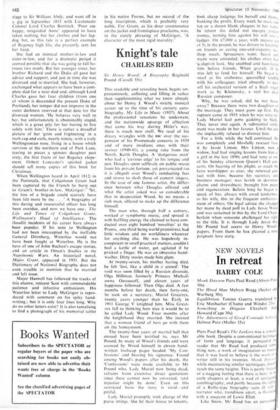Knight's tale
CHARLES REID
Sir Henry Wood: A Biography Reginald Pound (Cassell 55s)
This readable and revealing book begins un-, pretentiously, collating and filling in rather
than supplementing what we knew already about Sir Henry J. Wood's strictly musical career up to the time of his cursory auto-, biography, My Life in Mink (1937). About the professional vexatiOns he • underwent and the nationwide upsurge of affection- that came his way during Hitler-'s war, there is much new stuff. -We read of his
dreary wrangles with the sac over the sus- pension of his Promenade concerts in 1939 and of more insidious ones with their reviver (1940-41), a young rake from the North, Keith Douglas. A 'dangerous man' who had a 'curious edge' to his tongue and
pen, Douglas spent selflessly on public music from his private fortune, yet prevaricated (so it Is alleged) over Wood's conducting fees and- strove to slash those of concert singers. In the case of one famous .artist, the differ
enee between what Douglas. offered and what the artist asked was so considerable that in desperation Wood, by no means a rich man, offered to make up the difference himself.
The man who, through half a century, worked at symphonic music, and spread it with baffling energy (he claimed to have con- ducted over eight hundred 'novelties' at the Proms, one third being world premieres), had
little wisdom and no worldliness whatever for anything else. He was hopelessly in- competent in small.practical matters, couldn't boil a kettle of water, get agitated if he pricked a finger. He was an Obsessive hand: - Washer. Dirty stories made him glum.
At twenty-seven, his mother having died, he felt 'lost, like a child in a crowd' The void was soon filled by a Russian divorcee,
Olga Hillman, formerly Princess Michail- o-wna Ourousoff, and eleven :-years" of
happiness followed. Then Olga died. A few months before her death, then forty-one, he took on a secretary, Muriel Greatrex, twenty years younger than he. Early in
191 1 George V knighted him. Miss Great-. rex fell to thinking how nice it would be to
be called Lady Wood. Four months after the knighthood they married. She insisted that a woman friend of hers go with them on the honeymoon.
The twenty-four years of marital hell that ensued have been testified to, says Mr Pound, by many of Wood's friends and were avowed by Wood himself in eleven hand- written foolscap pages headed 'My Con- fessions' and bearing his signature. Found
among Wood's papers after his death, the 'Confessions' were made available to Mr
Pound who, Lady Muriel now being dead, refrains from extensive direct quotations since these cannot now be answered, 'and injustice might by done'. Even on this restricted basis the story is vivid—and pitiful.
Lady Muriel promptly took charge of the purse strings. She let their house to tenants,
took cheap lodgings for herself and Henry, banking the profit. Every week he made out ten or a dozen blank cheques in her name. In return she doled out meagre Pocket money, turning him against his will into a kadger. On 0,000 a year, with income tax at 5s in the pound, he was driven to lunching on friends or eating one-and-sixpenny lea. shop meals. Spruceness went; beard and mane were untended; his clothes often had 'a, slept-in look. She snubbed and humiliated him before friends. When gravely ill he was left to fend for himself. He began to , snarl at his orchestra; qUarrelled tetchily _with his colleagues; tried absurdly to pas, off his orchestral version of a Bach organ work as by Klenovsky, a -real but dead .Russian composer.
Why, he was , asked, did he not break away? Because .there were two daughters of the marriage. They must grow up first. The rupture-came-in 1935 when he was sixty-sit. Lady Muriel had gone gadding, to Sicily. They never -met again. A substantial settle- ment was made in her favour. Until the end she implacably refused to divorce him.
For a little while the hell continued. He was completely and blissfully rescued from it by Jessie Linton. Mrs Linton, now a widow, had had singing lessons from him as a girl in the late 1890s and had sung at one of his Sunday afternoon Queen's Hall con- certs. On hearing of his plight, as much the hero worshipper as ever, she renewed con- tact with him; -became his secretary and- business manager; was lavish in devotion. charm and shrewdness; :brought him peace. and fegeneration. Before long he began to speak of her, always with awed tenderness. as his wife, this to the frequent embarrass- ment of others. On legal advice she changed her name by deed poll to Lady Jessie Wood and was sustained in this by the Lord Cham- berlain when, someone challenged her right to the tide. It is through .Lady Jessie that Mr Pound had access to Henry Wood's papers. From them he has gleaned a most poignant love story.






































 Previous page
Previous page